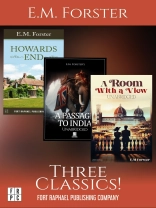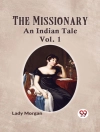Collected here are three of E.M. Forster’s classic novels: ‘A Room With a View, ‘ ‘Howards End’ and ‘A Passage to India, ‘ each a stand-alone masterpiece and all of them celebrated as among the finest novels of early 20th century literature.
In the first, ‘A Room With a View’ we follow the travels – both abroad and romantically – of young Lucy Honeychurch, who kindles a flirtation while on vacation in Italy, but then returns home to find herself in a passionless engagement. W...
Collected here are three of E.M. Forster’s classic novels: ‘A Room With a View, ‘ ‘Howards End’ and ‘A Passage to India, ‘ each a stand-alone masterpiece and all of them celebrated as among the finest novels of early 20th century literature.
In the first, ‘A Room With a View’ we follow the travels – both abroad and romantically – of young Lucy Honeychurch, who kindles a flirtation while on vacation in Italy, but then returns home to find herself in a passionless engagement. When the young man who stirred her heart in Florence becomes her neighbor back in England, Lucy is faced with a dilemma: Break off her engagement to the society-approved Cecil Vyse or follow her heart with the dashing George Emerson.
In ‘Howards End’ (considered by many to be Forster’s finest work), we meet three families: the idealistic Schlegels, the fabulously wealthy Wilcoxes and the impoverished Basts. When Ruth, the ailing matriarch of the Wilcox family, secretly bequeaths her beloved country house Howards End to Margaret Schlegel, it launches a series of events – including family strife, infidelities, and a secret pregnancy – which threaten to destroy all three families.
Finally, in ‘A Passage to India, ‘ Forster examines the cultural clashes in colonial India when a local physician is wrongly accused of assault against an English tourist while on a sojourn to the mysterious Marabar Caves. A fascinating and riveting look at race, power dynamics and colonial rule.
Long hailed as one of the most brilliant and beloved authors of the Edwardian era, E.M. Forster’s works have become among the most critically acclaimed and cherished novels of the past hundred years and have been adapted numerous times for the stage and screen. These three books are presented here in their original and unabridged formats.












